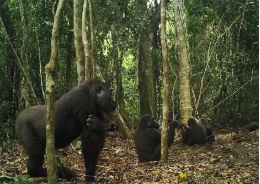A scientific expedition will study the gorilla population affected by the 2003 Ebola outbreak in the Congo
Image: Germán Illera
Studying the impact of the Ebola outbreak in 2003 on the current gorilla populations in the Lossi Gorilla Sanctuary, in the Republic of the Congo, is the objective of a scientific expedition of the Faculty of Biology and the Biodiversity Research Institute of the University of Barcelona (IRBio), coordinated by researcher Magdalena Bermejo, in which the experts José Domingo Rodríguez-Teijeiro and Àlex Barroso also take part.
The campaign, to take place from August to September 2019, will study the mid-term effects of the Ebola outbreak- that is, fifteen years after the infectious outbreak- on the current population of this threatened ape. With a global perspective, the final objective is to analyse the way in which some fatal events –such as the Ebola outbreak- can influence on the long run the social dynamics and genetic and demographical viability of gorilla populations.
The scientific expedition is an initiative from an international consortium launched by the entity Sabine Plattner African Charities (Congo Basin Conservation Research Network), with the participation of the government of the Republic of the Congo, the University Marien Ngouabi (Republic of the Congo), the University of Barcelona, the Institute of Evolutionary Biology (CSIC-UPF), the Doñana Biological Station (CSIC), Princeton University (United States) and the University of Rennes 1 (France).
More information
